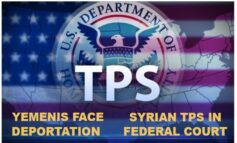
DALLAS (AP) — Prosecutors have dropped most charges against two men accused of helping a Muslim charity finance terrorism, an apparent sign that the government will focus its case on two other men who were leaders of the group.
Leaders of the Holy Land Foundation for Relief and Development, based in Richardson, Texas, are accused of funneling millions of dollars to the Middle Eastern group Hamas, which the U.S. government considers a terrorist organization.
A trial last year resulted in no convictions and a mistrial on most charges, leading prosecutors to narrow their aim for the second trial, scheduled to begin Sept. 15.
In a motion filed last week in federal court in Dallas, prosecutors requested the dismissal of nearly 30 counts against Mufid Abdulqader and Abdulrahman Odeh. The men each will still face three conspiracy counts that could send them to prison, if convicted, for 55 years.
Jurors in the first trial found Abdulqader and Odeh not guilty on many of the non-conspiracy charges, but the judge declared a mistrial. That meant prosecutors could have tried them again on those counts.
Former U.S. Attorney Matt Orwig praised the decision as “a better, smarter way to try this case.”
Prosecutors have narrowed their case to focus on the two men they portrayed as most active in running Holy Land: Shukri Abu Baker, the group’s chief executive, and Ghassan Elashi, the chairman.
They will face the same charges they faced in the 2007 trial: conspiracy, supporting a foreign terrorist organization, money laundering and filing false tax returns.
Another defendant, former Holy Land chairman Mohammed El-Mezain, will be retried on one conspiracy count. Jurors in the first trial acquitted him on all other charges, and prosecutors are not permitted to retry him on those counts.
Last year, jurors heard two months of testimony and deliberated for 19 days before deciding against convicting any of the five former Holy Land leaders or the charity itself, which federal agents shut down in 2001.
The U.S. government designated Hamas a terrorist organization in 1995, making it illegal to finance or raise support for the group, which seeks the destruction of Israel and carries out suicide bombings.
Defense lawyers countered that Holy Land merely provided humanitarian aid to schools and hospitals in Gaza and the West Bank.





Leave a Reply